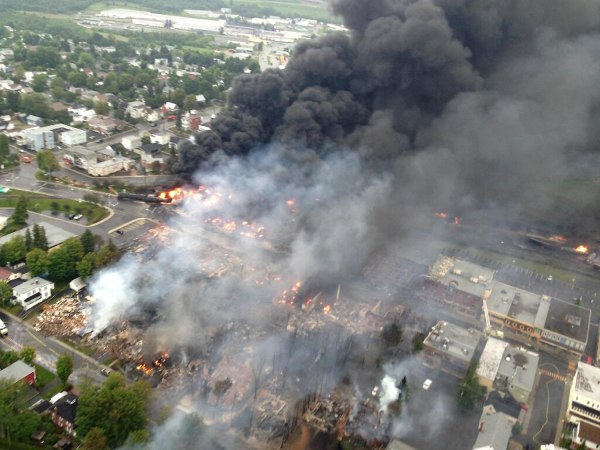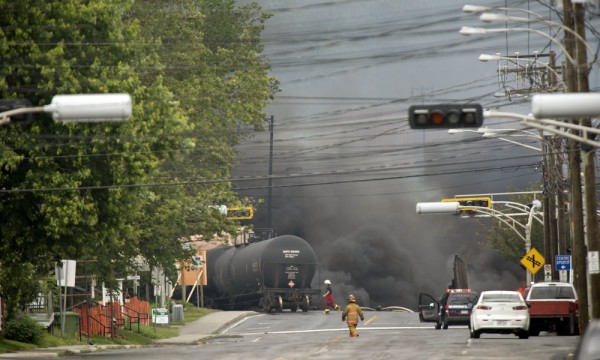
Sûreté du Québec
A Quebec town was evacuated after a train carrying petroleum products derailed and exploded in the early hours of Saturday morning, setting a massive blaze that authorities said continued to burn as responders feared additional blasts.
Several tanker cars exploded around 1 a.m. local time on Saturday in Lac-Megantic in the Canadian province, a lakeside town of about 6,000 people near the border with the U.S. Police said the blast was powerful enough to set ablaze several buildings in the town center that includes a library, bars, apartments, and stores.
"When you see the center of your town almost destroyed, you'll understand that we're asking ourselves how we are going to get through this event," town Mayor Colette Roy-Laroche said at a news briefing, according to Reuters.
An area of a half mile around the train has been secured by police, but the fire continued to burn through Saturday morning, Sergeant Gregory Gomez del Prado of the Quebec Provincial Police told NBC News.
"There are still wagons which we think are pressurized. We're not sure because we can't get close, so we're working on the assumption that all the cars were pressurized and could explode. That's why progress is slow and tough," local fire chief Denis Lauzon told Reuters.
Quebec town is evacuated after a train carrying petroleum products derailed and exploded causing a massive fire.
Police officials said they believe at least 50 tanks caught fire.
“It’s dreadful,” Lac-Megantic resident Claude Bedard told the CBC. “It’s terrible. We’ve never seen anything like it. The Metro store, Dollarama, everything that was there is gone.”
Over 1,000 people have been evacuated from the center of town and are being housed in a nearby primary school, Del Prado said. It is unknown when these residents may be allowed back into the area.
It is not yet clear whether anyone was injured, but Quebec Provincial Police say that they are still looking for some people that have been reported missing.
“There was a bar in the area open at the time of the accident. We know from the witnesses, that some of them were able to get out and escape the fire, others, they were with people that are still missing. We don’t know what happened to them,” Gomez del Prado said.
The Transportation Safety Board of Canada said it has sent four investigators to the scene of the accident. The investigators are set to arrive Saturday afternoon, and will be joined by additional investigators as the day goes on.
“At this point what we want to do is gather information,” said Chris Krepski, a spokesman for the TSB. “We will travel to the site to gather information, interview witnesses and talk to the operator, but we will have to wait until the area is safe and secure before we go in and examine wreckage.”
Prime Minister Stephen Harper tweeted that his "thoughts & prayers are with those impacted in Lac Megantic. Horrible news."
Police are working to locate any missing persons before investigating the cause of the derailment.
In the meantime, firemen from the surrounding area including some from Franklin County, Maine, worked to secure the area and put out the remaining fire.
“All of the firefighters in the surrounding areas have come to help,” Gomez del Prado said. “This blast, it’s a catastrophe for the town, a catastrophe for the people, and a catastrophe for the environment. It’s a major, major event.”
The rail line is operated by Montreal, Maine & Atlantic, which owns some 510 miles of track in Maine and Vermont in the United States and in Quebec and New Brunswick in Canada, according to Reuters.
Montreal, Maine, & Atlantic was not immediately available for comment.
NBC News’ Ian Johnston contributed to this report.

Paul Chiasson / The Canadian Press via AP
Smoke rises from railway cars that were carrying crude oil after derailing in downtown Lac Megantic, Quebec, Canada, Saturday, July 6, 2013. The derailment sparked several explosions and forced the evacuation of up to 1,000 people.
No hay comentarios:
Publicar un comentario